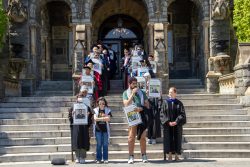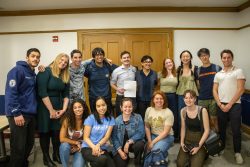The complete overhaul of the Georgetown University Student Association is a campaign platform that at least one pair of students runs on every year when they are seeking to become the leaders of our student government. Nearly every candidate who has ever run promises some kind of reform.
Talk of reform is popular. Hopefully reform is really just improvement. They go together. No one ever runs on a platform that lacks reform because it’s just not popular, practical or believable to say, “If elected, I promise to do nothing.”
This year, however, serious reform ideas seem to be coming from all sides. Members of GUSA are working on substantive ideas to change the way the student association works. Students outside of GUSA are working on dismantling it completely and reinstating a method of student government based on club representation.
Student government at Georgetown is a reflection of two things. First, and most importantly, student government reflects the moods and attitudes of the students. Second, student government reflects the attitude of the administration.
Marty LaFalce (CAS ‘03) and Catie Sheehan (CAS ‘01) have been working on a funding proposal for student clubs. Under their proposal, a student activities fee would become part of tuition fees and student activities could begin buying into the University’s endowment.
Funding for student activities has been a major issue for the past few years. GUSA candidates have promised to lobby for money or raise corporate donations. Until now, very little additional money has ever come from any GUSA initiative. LaFalce and Sheehan’s proposal could change all that.
Some of the credit for the possible increase in funding must go to Vice President for Student Affairs Juan Gonzalez. In his first year at Georgetown, Gonzalez has drawn criticism, particularly for his opposition to the block party. Administrative support will be critical in getting the funding proposal passed by the University’s Board of Directors. Gonzalez has been very supportive of increasing student funding, and his support will go a long way.
In this case, both students and administrators are behind real reform, and the reform has a good chance of success. Now the proposal will be placed on a special election’s ballot, in the hopes that a measure that has the strong support of the students will not face tough opposition from the Main Campus Planning Committee or the Board of Directors.
The funding proposal is now in the hands of the students at large, and it will be a test of the student aspect of student government. A handful of students who get elected to student government have little leverage for change without the support of the student body. A million annual reform ideas are worthless if the student body is not interested in reform.
This year students may get to choose: GUSA can stay the same, GUSA can undergo radical change or GUSA can be eliminated. These reforms are all well and good, but unless students stay engaged in large numbers they are likely to degenerate into similarly ineffective systems.




